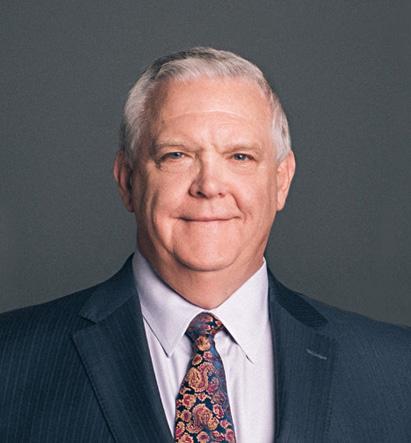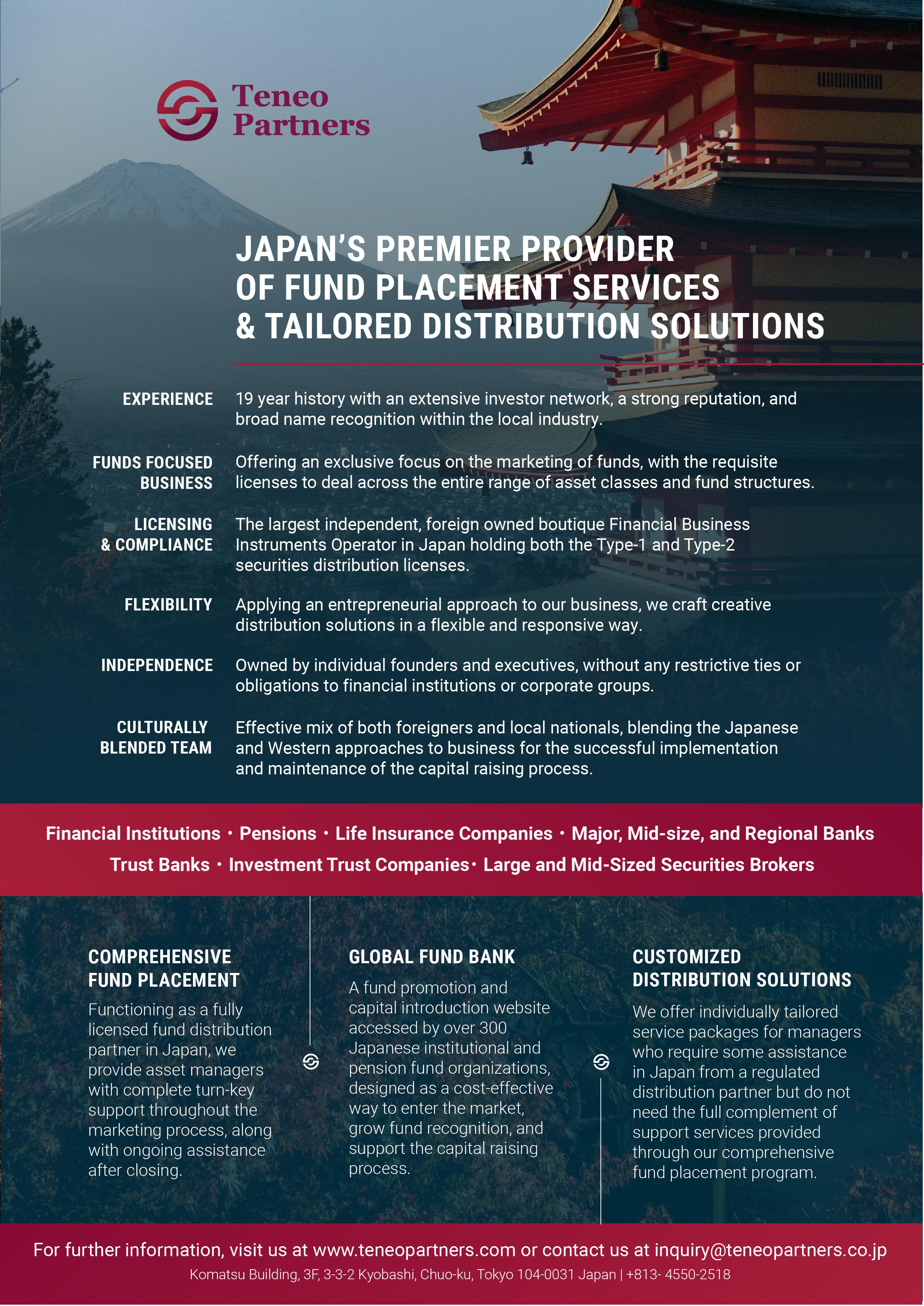
FUND PLATFORM


For managers outside Japan seeking to establish a Tokyo base of operations




A regulated, physical, and fund management infrastructure for housing key investment professionals on the ground
PENSION FUND DIM

Maximising Japan’s domestic strengths
Japan is focusing on utilising its domestic wealth and maximising the investment potential of its ageing population. This translates into opportunities for investment managers looking to grow their footprint in the country and establish a strong Japanese client base. In its endeavours to strengthen its reputation as a financial hub, Japan is also working to help foreign investors discover hidden gems within its capital markets.
Keiichi Aritomo, Executive Director of FinCity.Tokyo, outlines the country’s well-known demographic challenge which sees a third of the population being over 65. However, two thirds of Japan’s wealth is also in the hands of this group of people, making them very powerful indeed.
“We need to grow Tokyo as a financial centre to address these challenges,” Aritomo says, “To do this, we first have to upgrade our investment capabilities. Secondly, we have to ensure the sustainability of our investment. And third, due to the fact that we have quite extensive supply chains, we need to provide sufficient funding for SMEs to make these supply chains more secure, robust and resilient.”
In its “Global Financial City: Tokyo” Vision 2.0, the Tokyo Metropolitan Government (TMG) details how it aims to build an investment chain that links domestic and international capital demand to worldwide capital supply, against a backdrop of enormous domestic capital demand based on the existence of diverse companies and projects in Japan and domestic capital supply capacity.
Tokyo’s strengths include being the world’s third largest economy, coupled with approximately ¥1,900 trillion in personal financial assets, high levels of comprehensive strengths as a city, political stability, and firm rule of law.
Establishing Tokyo as a global financial city will involve creating a virtuous cycle of investment and return where asset managers and financial institutions are actively engaged in the market by supplying funds to domestic and foreign companies and projects, all supported by “comprehensive urban functions and enhanced social infrastructure”.

Supporting ESG disclosures
One way of advancing Tokyo among international investors sees FinCity.Tokyo and TMG supporting Japanese companies to better disclose their ESG credentials and endeavours.

“There are Japanese companies that aspire to address social issues to improve our society, but they don’t have enough capacity and capabilities to engage international investors,” says Aritomo, “They don’t know the ESG terminology and often don’t communicate in English. Therefore, their ESG ratings are low which results in limited traction from overseas investors. One project we have started is to address this issue by helping companies such as these to better communicate in English.”
Five companies formed part of this project last year and this year, this number has risen to 15.
Developing this information platform on ESG-related corporate initiatives is one of Japan’s major initiatives to further sustainable finance in the country. Companies are being encouraged and supported to disclose ESGrelated information on companies in a way that is easy for everyone to use. This will be done, “while taking into account the moves by the government and Japan Exchange Group to establish an information infrastructure and certification framework for green bonds.”
Japan also has broader green ambitions and has been promoting transition finance, encouraging investment in supporting high-carbon companies start their journey to becoming greener.
“We are trying to become a hub for transition finance for Asia. Japanese major corporates are already putting together their roadmap for transition finance. These corporates have extensive supply chain connectivity with the vast majority of Asian markets; therefore if other Asian companies get endorsed by Japanese corporates or Japanese regulators for transition financing, it can result in significant support from international institutional investors as well.”
Data from the government shows Japan’s share of the global sustainable investment market is still just 8%. Therefore, the room for growth here is significant.
In the document quoted earlier, TMG notes how the stimulation of green finance is becoming increasingly important as Tokyo aims to become a global financial center. This, “will accelerate decarbonisation efforts and contribute to sustainable recovery, leading to sustainable economic growth for Tokyo and, ultimately, to the realisation of affluent lifestyles for Tokyo residents,” the report says.
Encouraging investment
Japan is home to a significant bulk of household assets, circa ¥1,900 trillion in savings, which are under utilised. Putting this money to work is one of the critical junctures for the country to drive it’s financial agenda forward.
“We have sufficient money, but our investors are not sophisticated enough to diversify that investment across their wealth. So that’s why we would like to attract longterm oriented investors so that Japanese investors could follow their example,” Aritomo says.
International, sophisticated investors can engage the local market, influence and also maybe educate Japanese investors on how to implement a long-term investment strategy. This large accumulation of assets offers asset managers and foreign operators significant business growth opportunities.
Part of the focus is also being placed on supporting
emerging managers. Aritomo describes the programme being built to attract emerging managers, called “Emergence Japon,” due to be launched in the second quarter of 2023.
“We would like to have a broad range of investors chipping in an amount, for example around $5 million each, to encourage growth within the emerging manager we identify. These managers generate alpha and by investing early, asset owners can achieve some supplementing capabilities in securing the future capacity within their strategies,” he says. In its efforts to build this network of managers and investors, FinCity.Tokyo organises a number of events, the most important being the Tokyo Asset Management Forum on November 15. This provides matching opportunities for emerging managers and asset owners and every year, the organisation aims to have preeminent speakers on the agenda in order to elevate the level of information and education being provided.
TMG also provides asset managers with subsidies for outsourcing middle and back office operations. As a result, they have more time to focus on their core investment activities.
Strengthening capital markets
The Japanese market is considerably vast with around 3,800 companies. However, Aritomo explains that a very small portion of these, less than 150, are covered by international equity analysts – leaving 88% of Japanese companies untouched.
In Aritomo’s view, there are many undervalued, hidden gems in Japan which international investors can benefit from. Japan is the home to the third largest economy in the world, by GDP, and as a result has a broad variety of sectors and industries which can be invested in.
One way of helping these companies appeal more to foreign investors includes carving out a clear CFO role.
“Japanese companies are very peculiar. Companies, even large ones, have accountants but not necessarily a CFO. Companies in Japan are very good at accounting in terms of bookkeeping and reconciliation and internal control management, but we need to build out a bigger picture. We want these companies to have a CFO, someone who can design business models, carry out balance sheet optimisation, supply chain finance and data enabled projections,” Aritomo outlines.
Aritomo has ambitions for corporate CFOs to become an integral part of Japan’s capital markets. This will once again contribute to attracting more capital to Japan.
Through the initiatives detailed here and various other projects, Japan aims to build its reputation as a global financial city to encourage investment and engagement. Such activity will create a vibrant financial community while maximising the potential of domestic ownership and commitment.
Tokyo 2022 beckons offshore funds
ON THE GROUND PRESENCE
Japan continues to offer attractive investment opportunities to global investors. The second largest developed economy provides a comforting rule-of-law backdrop, which should not be taken for granted at the global level. Private market investment origination teams remain quite active. Real estate investment amounts by offshore investors, for example, over the past three years have consistently been over ¥1 trillion annually, despite the Covid-19 disruptions.
Investment opportunities can be found within a wide range of real assets in residential real estate, infrastructure, and commercial real estate, including subsectors such as office buildings, hospitality, logistics, and data centers. The recent yen devaluation has made long term investments in real assets even more attractive. For private equity funds, the opportunities may be more limited in number. Nonetheless, private equity funds with well-staffed origination teams, clear investment strategies, and the patience to find the right investments have been well rewarded. The competition for assets is fierce and new entrants, in both the real estate and private equity space, continue to make inroads.
Recent reports of investments in Japanese startups by Softbank Vision Fund and an investment in a domestic venture capital fund by the Government Pension Investment Fund, the first of its kind, have shone a light on a
sector that has garnered the attention of the Kishida administration. The government has established a cabinet-level post in charge of supporting startups. The intent is for the ministries and agencies to work in a coordinated fashion to develop measures to encourage startups and their subsequent growth and to make this the pillar of the government’s action plan for a “new capitalism”. Pioneering offshore investors, across all stages of venture capital financing, have established a beachhead presence and it is not unusual to find global investors on shareholder lists of Japanese startups. The recent investor and government initiatives have already reinvigorated this investment space and it will likely lead to new investors joining the fray.
On the public markets side, many of the global multimanager funds and managed account platforms continue to grow their already successful Tokyobased asset management businesses. As a result of geopolitical concerns, Covid-19 disruptions in the region, and a need for diversification of geographic and strategy risks, more global hedge funds, especially those with multi-strategy, multi-manager teams, have begun to consider a trading presence in Tokyo.
Diversifying the investor base
The offshore funds which have considered Japan as an essential destination to diversify their investor base continue to be well rewarded, despite the challenges. The more successful funds have had a long presence in Japan, either by having appropriately licensed fund-raising personnel on the ground or working with independent distributors. Knowledgeable offshore funds have also made it a point of covering different types of investors through multiple distribution channels. That said, fundraising in Japan remains a challenge and requires great effort, determination, and long-term commitment.
Pension funds, for example, must make use of regulated fiduciary managers such as trust banks and discretionary investment management (also known as DIM) firms to make their investments. Finding a firm with the necessary language skills, and the traditional as well as broad alternatives investment expertise is much harder than the number of DIMs (around 130) would imply.
near-zero interest rates in Japan, real estate and infrastructure funds continue to be popular for their steady income streams. Corporate pension funds tend to have relatively low return targets and the managers are not particularly incentivized to outperform those targets.
If anything, pension fund managers, fearing potential negative impacts on the plan sponsor finances, place priority on controlling investment risk. According to various surveys, returns for the year ending March 2022 averaged 3.5~3.7%. The larger and more sophisticated corporate pension funds, especially those that do not rely on consultants, have allocations to more illiquid private market strategies.
GORDIAN CAPITAL
Gordian Capital Japan is a Tokyo-based asset manager offering operational and infrastructure solutions to support offshore asset managers establish a Tokyo base for research and trading of both public and private-market assets. In addition, in its capacity as fiduciary manager, it invests in offshore funds across a wide range of public and private market strategies on behalf of domestic pension funds. Gordian Capital Japan operates under a Discretionary Investment Management and Advisory license under the Financial Services Agency of Japan. It is also a Registered Investment Advisor with the United States SEC.

Contact: Alvaro Tamura info@gordian-capital.co.
+81 3 4520-2323

High setup costs and language barriers are a concern but over the last couple of years, many asset managers have taken advantage of government and industry initiatives, including those offered by the Tokyo Metropolitan Government, FinCity Tokyo, and the FSA. That said, an investment in a fully licensed and regulated operation in Japan is a significant one, both in terms of cost and time. As an alternative to setting up a fully licensed operation, Gordian Capital, a specialised and fully licensed asset manager, holding a full Discretionary Investment Management license, an Investment Advisory license and a SEC Registered Investment Adviser license. The firm provides practical solutions to significantly reduce the time, cost, and uncertainties of establishing a regulated base in Tokyo enabling global managers to house key investment professionals on the ground in a fully regulated infrastructure.
The large firms have set up separate business units to handle third-party products but many of them have long-established relationships with competing products thereby creating a shelf-space problem for new offshore managers seeking to enter the market. The alternative is to work with independent fiduciary managers, who do not manage their own capital or funds, such as Gordian Capital Japan, with the necessary language, investment expertise, and established relationships.
Corporate pension funds continue to increase their allocations to alternatives. By some accounts, alternatives currently account for over 20% of their assets, up from 8% a decade ago. Given the continued
In a career spanning over 21 years at Morgan Stanley in NY and Tokyo, Alvaro was a founding member of the Japan interest-rate derivatives desk covering global macro funds, the Japan Global High Yield trading desk, and the Japan Special Situations Group. Alvaro earned a BSE in Electrical Engineering and Computer Science from Princeton University and an MBA from The University of Chicago.
 Alvaro Tamura Managing Director & CEO, Gordian Capital Japan Limited
Alvaro Tamura Managing Director & CEO, Gordian Capital Japan Limited



